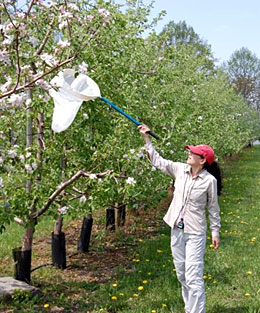Frontiers symposium to celebrate women life scientists
By Krishna Ramanujan

Women in academic science disciplines face uphill battles, from balancing work and family to competing in male-dominated fields after attaining their doctorates.
In an effort to address such challenges and seek guidance and inspiration from successful women life scientists, more than 30 Cornell students and postdoctoral researchers have organized "Frontiers in the Life Sciences: a Symposium Celebrating Excellence." The April 2-3 event will bring eight elite female life scientists to campus for lectures, mentoring, networking and discussions.
The visiting researchers, which include a Nobel laureate, a MacArthur fellow and National Academy of Sciences members, will give formal research presentations on the first day and attend a dinner with graduate and faculty hosts at the Herbert F. Johnson Museum of Art.

On the second day, they will visit host departments in their fields to lead discussions on topics related to science and gender. The day will culminate in a research poster session and reception for students and postdoctoral researchers.
"The symposium is a reminder that women can be successful in life sciences, and many of these women have families, so they have found ways to balance career and life," said Mia Park, an entomology graduate student who helped coordinate the student volunteer organizers.
The invited scientists are behavioral ecologist Jeanne Altmann, Princeton University; chemical ecologist May Berenbaum, University of Illinois; neurobiologist Linda Buck, University of Washington; marine microbiologist Nicole Dubilier, Max Planck Institute, Bremen, Germany; human geneticist Mary-Claire King, University of Washington; plant biologist Sharon Long, Stanford University; ecologist Mary Power, University of California-Berkeley; and plant geneticist Pam Ronald, University of California-Davis.
"I am used to going to seminars and conferences where the overwhelming number of speakers are men, so it's important for me to attend an event that celebrates excellence and addresses the gender skew found in science," said Laura Martin, a natural resources graduate student who will conduct Q-and-As with scientists and post them online.
Retention of women in science will be a key topic at the symposium. Women account for more than half of all graduate students in the field of ecology, but fewer than 30 percent of tenured ecologists are women, Martin said.
"In life sciences, we have no problem recruiting brilliant women as grad students, but we do have a problem retaining them as tenured professors," said Robert Raguso, lead faculty organizer of the symposium. Four other faculty and members of CU-ADVANCE were instrumental in organizing the conference.
The idea for the symposium grew from Raguso's role as chair of the A.D. White Professors-at-Large Program. Raguso sent out an email to some 50 graduate students and faculty soliciting nominations for esteemed woman in life sciences, which "generated an amazing list," he said.
"I recognized right away that this is something that I should not let drop. My thought was, 'Oh, we have a symposium!'" he said. At that point, the graduate students jumped in.
Symposium participation requires registration, with deadlines as follows: March 26 for day one; registration for morning activities on the second day will be organized by host departments. Students who want to present a poster on day two need to register by March 19. Register online at http://www.eeb.cornell.edu/frontiers/Registration.html.
The symposium is supported by the President's Council of Cornell Women, CU-ADVANCE, the Office of the Vice Provost for Research, the Graduate School, the Boyce Thompson Institute for Plant Research and the academic host departments, including Plant Biology, Neurobiology and Behavior, Ecology and Evolutionary Biology, Entomology, Psychology and Molecular Biology and Genetics.
Media Contact
Get Cornell news delivered right to your inbox.
Subscribe